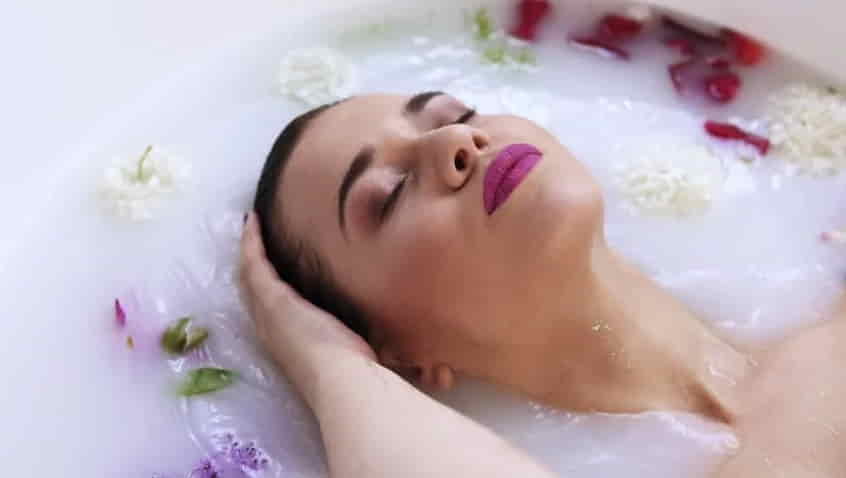Table of Contents
What is a milk bath?
A milk bath milk is a bath where you add milk — in liquid or powdered form — to warm water in your bathtub. It may be beneficial for a number of skin conditions including eczema, psoriasis, and dry skin.
Read on to learn more about the benefits and risks of milk baths, and how to try milk baths at home.
Read also:
5 Benefits
Research is limited on the effectiveness of milk baths on the treatment of skin conditions. Where scientific research is lacking, there’s anecdotal evidence.
Always talk with your doctor before using milk baths for the treatment of skin conditions.
1. Dry Skin
If you have dry skin, a milk bath can help bring back moisture. Milk has:
- proteins
- fat
- vitamins
- minerals
- lactic acid
The proteins and fat may help soften and soothe the skin. And lactic acid is a gentle exfoliator. Exfoliation is important for shedding dead skin cells, which can lead to softer skin.
A study on skin care for women over 65 found that milk baths effectively relieved itchy skin, also known as pruritus.
2. Eczema
Eczema often causes rashes, bumpy skin, and irritation. Studies about the efficacy of milk baths for eczema are limited.
One study found that applying human breast milk to a baby’s skin worked just as well as hydrocortisone ointment for treating eczema. However, more research is needed.
There isn’t currently any evidence that milk baths for adults are an effective treatment for eczema. It shouldn’t replace your prescribed skin medication.
If you find milk baths soothing, talk to your dermatologist to confirm they are safe for your skin.
3. Psoriasis
A milk bath may help treat psoriasis symptoms, including itchy, flaky, or patchy skin. However, scientific research is limited on the effectiveness of a milk bath to treat psoriasis.
If you enjoy milk baths, confirm with your doctor that they are safe for you to take.
4. Poison ivy
Milk baths can help ease poison ivy symptoms by soothing redness, itching, and inflammation. However, there isn’t much research yet to confirm how effective they are.
5. Sunburn
Milk is packed with proteins, fats, amino acids, and vitamins A and D that can help calm and soothe sunburned skin. Soak in a milk bath for up to 20 minutes, then apply aloe vera or a moisturizer for the best results.
Are milk baths safe?
Milk baths are not safe for everyone. Avoid them if you have sensitive skin. The lactic acid in milk may irritate it.
Also avoid milk baths if you have a high fever.
If you’re pregnant, talk to your doctor before taking a milk bath. Get out of the bath right away if you feel faint, dizzy, or unwell. And remember, don’t drink the bathwater—it’s not safe to consume.
What types of milk can you use in a milk bath?
You can use various types of milk in a milk bath, including:
- whole milk
- buttermilk
- coconut milk
- goat’s milk
- powdered milk
- rice or soy milk
There’s little proof that one type of milk works better for skin, so try different kinds to see what you like best. Avoid skim milk, though. The full-fat version of milk will be more nourishing for your skin.
How to take a milk bath?
To make a milk bath, you can add 1 to 2 cups of milk to a full tub of warm water. You can also add in essential oils, bath salts, honey, or baking soda for additional benefits.
Ingredients
- 1 to 2 cups powdered milk (or milk of choice)
- Optional add-ins: 1 cup Epsom salt, baking soda, oatmeal, honey, or 10 drops of an essential oil
Instructions:
- Fill the bathtub with warm water and add milk (plus any optional ingredients).
- Use your arm or foot to mix everything together.
- Soak and relax for 20 to 30 minutes.
Where to buy milk for milk bath?
You can find ingredients to make your own milk bath online or at your local pharmacy. Look for powdered milk online or use the liquid milk you may already have in the fridge.
You can buy ready-made milk bath mixes online. Just check the label to ensure you’re not allergic or sensitive to any of the ingredients.
Conclusion
Milk baths can help soothe dry, itchy skin, but they’re not a substitute for your regular skin treatments. Always consult your doctor or dermatologist to make sure milk baths are safe for you.
For More Home remedies and information visit: Remedyu.
